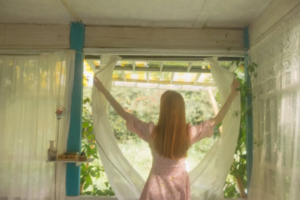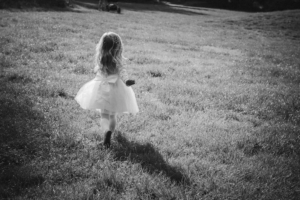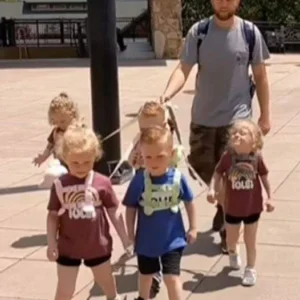I Saw a Lonely Little Girl with a Red Bag at the Bus Stop Every Evening — One Morning, I Found Her Bag on My Doorstep
In her new neighborhood, Samantha couldn’t help but notice a solitary little girl clutching a red bag at the bus stop every evening. Something about her felt out of place, but Samantha dismissed it as a passing thought. Then, one morning, she found the girl’s red bag on her doorstep, carrying a truth so heavy it moved her to tears.

When I moved to this quiet little neighborhood, I thought it was my chance to start fresh. At 32, single, and leaving behind the chaos of eight years in a relentless city newsroom, I needed the stillness more than I knew.
The street I now called home was lined with towering maple trees, their silvery leaves whispering secrets in the breeze. The houses stood like old storytellers, with peeling paint and flower boxes overflowing with late-summer blooms. Few cars passed by, and the neighborhood offered a forgotten symphony of nature—the morning chirps of sparrows, the rustle of leaves, and the distant bark of a dog.
The first evening as I unpacked, I noticed her. A little girl standing alone at the bus stop across the street. She couldn’t have been older than eight, wrapped in a red jacket that seemed too big for her small frame. In her arms, she clutched a red bag like it held her entire world. She wasn’t lost, but she didn’t seem to be going anywhere either.
Her gaze, distant and heavy, wasn’t directed at me but at my house—or perhaps through it, into something beyond. Even from afar, her eyes told stories of loneliness and emotions too deep for her age.
I thought she was waiting for someone. Perhaps she’d be gone tomorrow.
But the next evening, she was there again. Same time, same place, same red bag.
By the third evening, curiosity had taken root. Pacing my living room, I found myself glancing out the window. There she was, still and silent, her presence both eerie and magnetic.
“Just go ask if she’s okay,” I told myself, using the same determined tone I had once reserved for reluctant sources.

I stepped outside, but before I could call out, she turned and bolted down the street. Her red bag bounced against her back like a silent alarm, warning me not to follow.
The next morning, as sunlight crept through my kitchen window, I noticed something on my doorstep. It was the little girl’s red bag.
I picked it up, surprised by its weight. The strap was worn and frayed, the kind of wear that spoke of years of care. I opened it and found tiny creations inside: dollhouses made from bottle caps, dolls sewn from scraps of fabric, and toy cars pieced together with bits of wire.
At the bottom of the bag was a folded piece of notebook paper. The handwriting was uneven, trembling with urgency:
“My name is Libbie. I make these toys to pay for my grandma’s medicine. She’s very sick. My mom and dad died in a car crash three months ago. Please, if you can, buy them. Thank you.”

My chest tightened, and tears filled my eyes. This little girl had been standing at that bus stop, not just waiting for customers but for someone to notice her, to see her pain.
I stuffed every dollar I had into the bag. This wasn’t a transaction—it was an act of connection.
That evening, I waited by the window. Just as the sun dipped below the trees, I saw her approach, her steps cautious and deliberate.
“Hello there,” I called softly as I stepped outside. “It’s okay. You don’t have to run.”
Her wide eyes darted to mine, filled with a mix of fear and hope. For a moment, I thought she might flee, but instead, her shoulders sagged just slightly.
“Would you like to come inside?” I asked gently. “I have cookies and milk.”
After a pause, she nodded, the tiniest movement that spoke volumes.
Inside, she sat at my kitchen table, cradling the warm mug of milk. Between sips and nibbles of her cookie, she told me her story. Her parents had died in a car accident three months ago. She and her grandmother, who was very sick, were all each other had.
“I stand at the bus stop because it reminds me of them,” she said, her voice trembling. “My dad used to take me to school, and my mom would wait for me there.”
Her words pierced me. This little girl, burdened by loss, was holding onto a routine that kept her parents’ memories alive.
“You’re not alone, Libbie,” I said, placing a hand over hers. “I’m here now, and we’ll figure this out together.”

That moment marked the beginning of a new chapter for both of us.
A year later, everything had changed. I married Dave, my long-time boyfriend, and together we adopted Libbie. Our once-quiet house was now filled with her laughter and curiosity.
Libbie’s grandmother, Macy, moved in with us and received the care she needed. The desperate worry about her health was replaced by shared responsibility and love.
As for Libbie, she thrived. Back in school, her world expanded beyond survival. The toys she once made out of necessity became an expression of joy and creativity. With our help, she started a small online store for her creations, and people fell in love with her story.
Some evenings, I’d still find her at the bus stop, holding her red bag—a new one now, but still red. When I asked why, she smiled and said, “It’s nice to remember the good times. But it’s even nicer knowing I can come home to you.”
Every time she said that, I thought back to the first evening I saw her—a lonely girl with a red bag, waiting at a bus stop between memory and hope. That chance encounter redefined family for me.
Some stories aren’t written. They’re discovered, one moment at a time.


